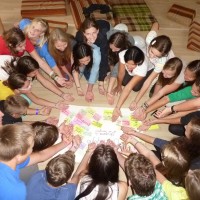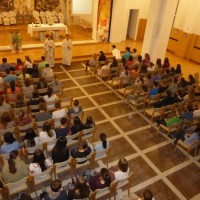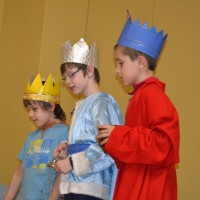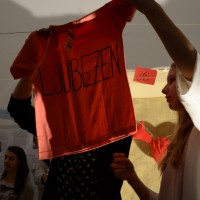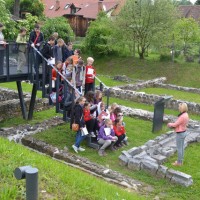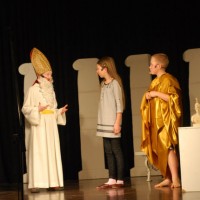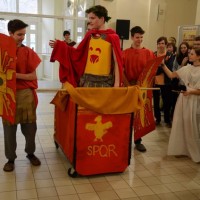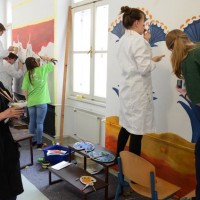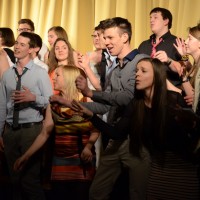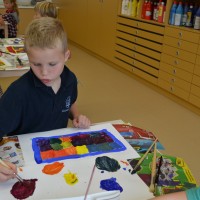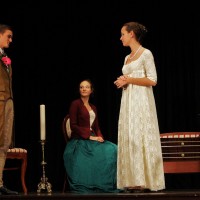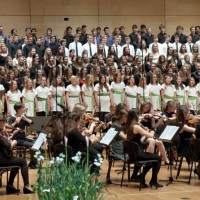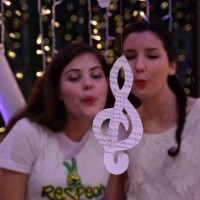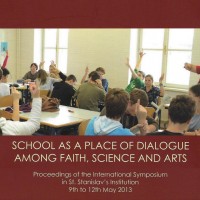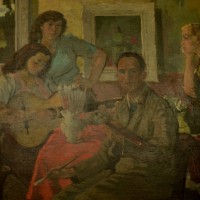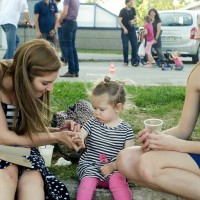St. Stanislavs’ Institution is a place for comprehensive personal growth from kindergarten to the end of secondary education. In addition to obligatory subjects that are part of the state’s school curriculum, special emphasis is placed on community formation, solid relationships, outdoor learning, practical work, as well as ethical and spiritual topics that originate from Christianity.
Pastoral care
Pastoral care at St. Stanislav’s Institution is meant to guide students’ personal growth, to introduce them to independent living and to create favourable conditions for a mature and independent decision for faith. The basic principles shaping our spiritual activities include respecting the various paths of spiritual searching, the circumstances from which the young come and their inner experiences.
Activities are led by priests who are chaplains in the various schools of the Institution, and are performed in collaboration with students and teachers. These activities consist of regular worship, spiritual guidance, and developing a sense of responsibility for charity and volunteer work. There is a daily morning and evening Mass in the Institution and the students begin their school day with a prayer or spiritual topic for contemplation. The students attend spiritual retreats. Religious holidays and the beginning and the end of the school year are solemnly celebrated with a Mass for the students, their parents and employees. We observe Advent and Lent with special activities.
- Pastoral care in the Diocesan Classical Gymnasium
- Pastoral care in the Student Home
- Pastoral care in the Primary School
- Pastoral care in the Kindergarten
Charitable activities
Charity is a value closely related to the mission of the Institution, towards which students, their parents and employees in all sectors strive. Jesus Christ is the first foundation and example of charity. One of charity’s primary tasks is to encourage each individual to do something good for another.
The students perform charitable work by helping in different volunteer organisations and participating in mission and summer work camps. Individual divisions of the Institution also help each other, for example through organised study groups. Collaborative activities during Advent and Lent include helping people in need at home and abroad.
- Charitable activities in the Diocesan Classical Gymnasium
- Charitable activities in the Jeglič Student Home
- Charitable activities in the Alojzij Šuštar Primary School
Classical education
The key elements of the mission of St. Stanislav’s Institution – the integral development of the student, personal growth, and creating the conditions for this growth and world view – correspond to the basic patterns of classical education.
Discovering classical culture and learning Latin and classical Greek means not only learning both languages, but also discovering the ancient civilization which represents the foundation of the spiritual world to which we, as Europeans, belong. Emphasis is laid on the student’s comprehensive interest in different perspectives of life: social and personal reality, nature and spirit, the visible and invisible world.
The linguistic meaning of classical (classicus) refers to the best, enduringly valuable and normative. Learning both languages fosters skills in deduction, logical thinking and especially memorization, and thus encourages order, physical and spiritual discipline, connecting concepts, arguing, and learning how to learn.
- Classical education in the Diocesan Classical Gymnasium
- Classical education in the Alojzij Šuštar Primary School
Arts
Music and musical activities have had a special place in the educational process since the foundation of St. Stanislav’s Institution. We therefore place much emphasis on providing quality musical activities that involve as many students as possible. These activities range from singing in choirs, performing in string orchestra, singing in class, to performing in smaller, student-initiated vocal and instrumental ensembles. St. Stanislav Girls’ Choir of the Diocesan Classical Gymnasium and St. Stanislav Youth Choir of the Diocesan Classical Gymnasium are one of the best choirs in Europe.
The Music School of St. Stanislav’s Institution offers quality and valuable education in this field.
Fine Arts is primarily meant to encourage aesthetics and develop students’ observation and drawing skills, persistence, contemplation and creativity. Several clubs in primary school and the School of Fine Arts in gymnasium try to enhance the educational process in this perspective.
Drama clubs in Slovene and foreign languages encourage students in public performance, creativity and memorization. Team work improves responsibility, trust and support as well as openness to different interpretations and innovation.
Sports
The key element of the mission of St. Stanislav’s Institution – the integral development of the student – corresponds to the basic patterns of sports activities in school. A vast range of sports available take place in three main sports halls – two in the cental building (the big one (42m x 22m) and the small one (9,5m x 18m) mainly for the purposes of gymnasium; and one in the new building (44m x 24m) mostly for the purposes of primary school. Also on the school premises is an outdoor playing field with a running track and basketball court. The big sports hall in the central bilding includes a free-climbing wall size of 18m x 12m, designed anew in 2014.
After classes, students have the opportunity to participate in a wide range of sports clubs. They take part in separate competitions in different events on regional, national and international levels.
Other activities
Apart from the fundamental educational mission of all six schools, there are other activities and bodies which importantly underpin and support the educational work in St. Stanislav’s Institution. These are the music making in choirs; research work of the Institute for Education Research and Development (InERD); exhibitions in the Slovene Home and the valuable boost of the Alumni Club.
Choirs
The thriving musical education invites everyone to make music and sing, regardless of ability. The DCG in cooperation with the Music School provides a variety of opportunities to perform with remarkable teacher artists in ensembles, bands and especially in the five choirs, which are renown for their diversity of repertoire.
Institute for Education Research and Development (InERD)
Development and research are at the very core of St. Stanislav’s past and present work with the young. It is carried out mainly through the IESR, which offers support in this field and represents a valued link also with other Catholic schools in Slovenia.
Exhibitions
The Slovene Home has been carrying out St. Stanislav’s Institution’s cultural mission since its foundation in 1992. It organises exhibitions of Slovene and foreign artists, as well as guided tours of the Kregar Gallery and the Tršar Room. Through its cultural and artistic activities it connects with Slovene emigrants and compatriots abroad.
Alumni Club
The aims of the DCS Alumni Club is to keep fromer students in touch with one another and also with current students as well as to maintain and strengthen the classical tradition and values of DCS. This is achieved through different events.
